Unit2 学案
高二英语人教版选择性必修第一册学案:Unit 2

Unit 2 Looking into the FutureLearning About Language掌握本节生词及句型表达与运用。
1. security2. 犯罪活动,不法行为3. combine将来进行时一、将来进行时的构成和概念将来进行时由“will/shall be +现在分词”构成,shall 用于第一人称,will 用于各种人称。
将来进行时表示将来某一时间正在进行的动作,常表示已经安排好的事情。
二、将来进行时的用法(1)表示将来某一时刻或某一时间段内正在进行的动作,常与at this time tomorrow, at…o’clock tomorrow afternoon 等表示将来某个具体时间点或时间段的时间状语连用。
(2)将来进行时可以表示已经计划好的事(3)将来进行时用来表示委婉客气(4)将来进行时可以表示现在正在进行的动作,但这个动作会延续到将来。
(5)将来进行时可以用于解释原因。
【注意】一般将来时强调的是“将来要发生”的动作和状态,而将来进行时表示“将来某个时间正在进行”的动作。
练习一、根据汉语意思,用句末括号内单词的正确形式完成句子。
1.省省吧!别叫我出去了。
你知道我今晚会准备考试。
(prepare)Save your breath! Stop asking me ont. You know I .2.当我到家的时候,我妻子可能会正在看电视。
(watch)When I get home, my wife .3.对不起,我明天下午不能到机场去送你了。
那时我正在给一群学生作演讲。
(address)I'm sorry that I can't see you off at the airport tomorrow afternoon. I ______ a groupof students then.4.你最好不要在今晚7 点到8 点之间给经理打电话,因为他那时正在开一个重要的会。
Unit2Roadstoeducation单元全课时学案(上教版必修二)

高中英语上教版高一年级必修二学案第二单元Roads to education第一课时(学生版)课题:Reading and interaction: An experiment in education (I)课时学习目标:●了解本文中教育实验的事实信息;●选择实验中的内容作为预告片素材,并陈述预告片的场景。
I. Pre-reading1.1 Answer the question according to the picture.What’s this place?______________________________________________________________________________1.2 Study the two phrases and guess their meaning.“unteachable” :______________________________________________________________________________“Schoolteacher of the Year”:_______________________________________________________________________________II. While-reading2.1 Scan paragraph 1 and answer the questions below.➢Where did the writer see the experiment?____________________________________________________________________________________________ __________________________________________________________________➢Where did the experiment take place?____________________________________________________________________________________________ __________________________________________________________________➢How long did the experiment last?____________________________________________________________________________________________ __________________________________________________________________➢Who were involved in this experiment?____________________________________________________________________________________________ __________________________________________________________________2.2 Scan paragraph 2 and complete the profiles below.2.3 Scan paragraph 3 and complete the table below.2.4 Scan paragraph 4 and answer the following question.➢What was the writer’s attitude to this show?____________________________________________________________________________________________ __________________________________________________________________III. Post-readingDesign a trailer (预告片) for this show.____________________________________________________________________________________________ ______________________________________________________________________________________________________________________________________________________________ __________________________________________________________________IV. InteractionThink about the following question and have a discussion with your classmates.➢What do you think will happen in the following two weeks? Why?V. Assignments1. Listen to the audio recording of the text and read the text at least twice.2. Finish the summary exercise on page 26 in the textbook.高中英语上教版高一年级必修二第二单元Roads to education第二课时(学生版)课题:Reading and interaction: An experiment in education (II): Deep reading课时学习目标:●分析教师的教学策略;●深入理解文本中教和学的关系;●选择适合自己的学习策略,并陈述理由。
Unit 2 Ways to go to school第三课时学案(含答案)
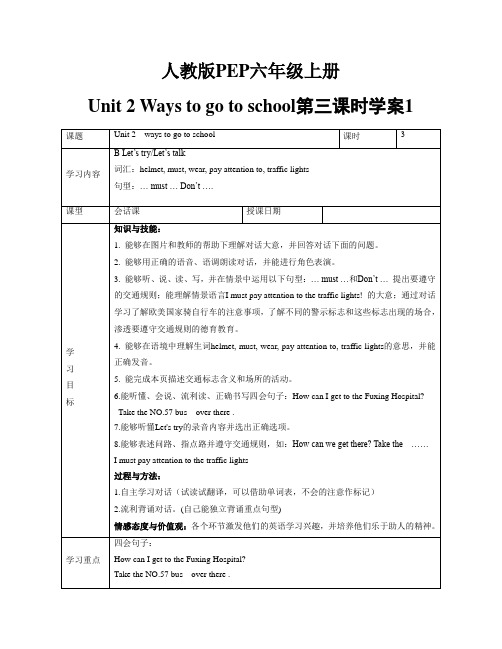
课型
会话课
授课日期
学
习
目
标
知识与技能:
1.能够在图片和教师的帮助下理解对话大意,并回答对话下面的问题。
2.能够用正确的语音、语调朗读对话,并能进行角色表演。
3.能够听、说、读、写,并在情景中运用以下句型:… must …和Don’t …提出要遵守的交通规则;能理解情景语言I must pay attention to the traffic lights!的大意;通过对话学习了解欧美国家骑自行车的注意事项,了解不同的警示标志和这些标志出现的场合,渗透要遵守交通规则的德育教育。
(2)They’re from my cousin in the USA.
(3)Don’t go at the red light.
(4)I must pay attention to the traffic lights.
5、小组展示(Group show) Tell your partner What do these signs mean?
2、听录音跟读let’s talk.
3、你能流利朗读对话吗?大声读给你的组员听吧!听谁的发音最正确、音调最正确。
(1)小组内自由读。
(2)各小组长领读,全班跟读。
(3)小组推荐优秀组员分角色表演。
4.你能用英语写出下面的句子吗?
(1)我怎样到达复兴医院?
____________________________________
三、课堂检测:
How to by on near go get
选词填空
1.My homeis_______thehospital
2._______do you go toschool?Igo toschool____foot.
Unit 2学案设计(1-5课时) 2021-2022学年人教版英语七年级上册

Unit 2This is my sister.Period 1Section A 1a~2c【课型】听说课学习目标1.能掌握本课重点词汇即对家庭成员的称呼的词汇:sister,mother,father,parent,they,及指示代词this,that,these,those 等,并能运用who引导的特殊疑问句Who is that?及其答语介绍家庭成员,掌握与介绍人物和辨别人物相关的核心句型和重点词汇及语言结构“Are these your parents?Yes,they are.This is my mother,Jenny,and this is my father,Tom.”等。
2.能基本听懂含有本课重点词汇和目标语言的听力材料。
3.能运用所学的词汇及句型介绍自己的家庭成员。
学习过程【自主学习】再次将前面所学人名巩固复习一下,并且将介绍人物的语言复习一下。
【师生互动】[新课导入]Step 11.Daily greetings.—Hello.What’s your name?—My name is ...2.—Is he Eric?—Yes,he is.—Is she Cindy?—No,She isn’t.She’s Helen.3.—This is...(利用书上出现的人物图片说出名字。
)—Alice.This is Alice.—They are ...—Mike and Tom.They are Mike and Tom.[新知呈现]Step 21.—What’s this in English?—It’s a picture/photo.Can you see this woman?This is my mother.(write the new word “mother” on the blackboard.) She is my mother.2.Finish 1a.You can see a picture of David’s family and some words we learned just now.Please match the words with the people in the picture.[新知学习]Step 3:Listen to 1b1.Play the recording for the first time.Circle the words.Check the answers.2.Play the recording a second time.Pay attention to David’s introductions of his family.3.Listen again and read after it.Step 4:Pair work (work on 1c)1.Practice the conversation in 1b in pairs.2.Role-play the conversation.Take turns to introduce David’s family members.观察与思考11.听力1b中用来指认人物的指示代词有,,等。
教师备课——英语七年级下UNIT2教案2
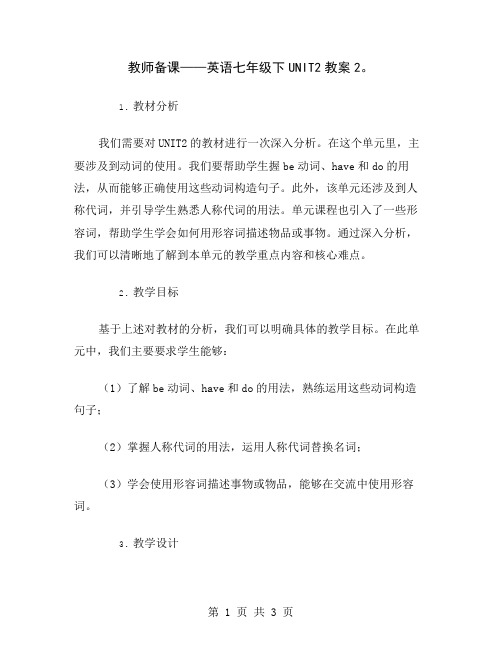
教师备课——英语七年级下UNIT2教案2。
1.教材分析我们需要对UNIT2的教材进行一次深入分析。
在这个单元里,主要涉及到动词的使用。
我们要帮助学生握be动词、have和do的用法,从而能够正确使用这些动词构造句子。
此外,该单元还涉及到人称代词,并引导学生熟悉人称代词的用法。
单元课程也引入了一些形容词,帮助学生学会如何用形容词描述物品或事物。
通过深入分析,我们可以清晰地了解到本单元的教学重点内容和核心难点。
2.教学目标基于上述对教材的分析,我们可以明确具体的教学目标。
在此单元中,我们主要要求学生能够:(1)了解be动词、have和do的用法,熟练运用这些动词构造句子;(2)掌握人称代词的用法,运用人称代词替换名词;(3)学会使用形容词描述事物或物品,能够在交流中使用形容词。
3.教学设计基于教材分析和教学目标,我们需要进行详细的教学设计。
我们可以通过提供一些生动的语言材料,向学生展示be动词、have和do 的用法。
在这个过程中,可以帮助学生发现一些常见的语言规律和用法,如肯定句、否定句和疑问句等。
同时,也可以通过练习帮助学生熟悉这些动词的使用方法。
我们可以引导学生熟悉人称代词的使用。
通过对语言材料的分析和练习,学生可以逐渐理解代词在句子中的作用和用法,并掌握有效地使用人称代词进行交际的技能。
我们可以引入形容词,让学生重点了解形容词与名词搭配方法,并且在生活实践中加强彼此搭配的印象。
在此过程中,教师要注意语言的生动性和趣味性,让学生更好地理解用法,同时,鼓励他们在交流中积极运用词汇。
4.教学评估在教学过程中,我们需要对学生的掌握情况进行评估。
在这个过程中,我们可以使用各种形式的评估方法,如听力、口语、阅读和写作等,以帮助学生全面地巩固并使用教材中的词汇和语法。
5.课后回顾最后要注意的是,教师在教学结束后,应该对教学过程进行总结和回顾,以保证学生可以更好地理解和掌握所学的内容。
在回顾过程中,可以和学生讨论一些重点难点,从而加深对其的印象,巩固所学的知识。
人教版八年级英语上册教材Unit2 教案
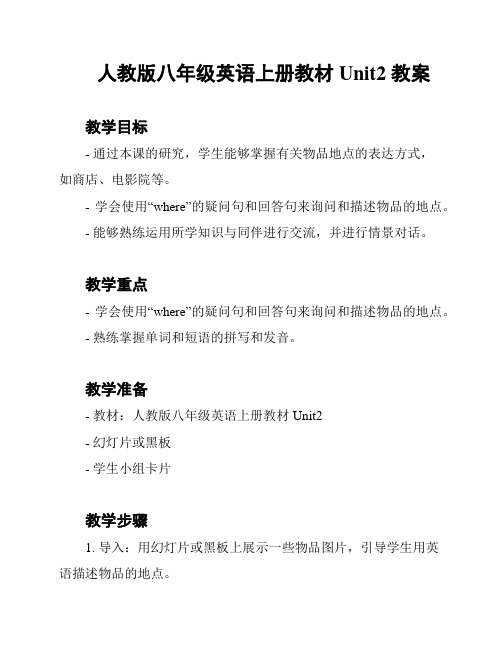
人教版八年级英语上册教材Unit2 教案
教学目标
- 通过本课的研究,学生能够掌握有关物品地点的表达方式,
如商店、电影院等。
- 学会使用“where”的疑问句和回答句来询问和描述物品的地点。
- 能够熟练运用所学知识与同伴进行交流,并进行情景对话。
教学重点
- 学会使用“where”的疑问句和回答句来询问和描述物品的地点。
- 熟练掌握单词和短语的拼写和发音。
教学准备
- 教材:人教版八年级英语上册教材Unit2
- 幻灯片或黑板
- 学生小组卡片
教学步骤
1. 导入:用幻灯片或黑板上展示一些物品图片,引导学生用英
语描述物品的地点。
2. 研究新知:通过教材Unit2的相关内容,教授目标词汇和短语,让学生理解并记忆。
3. 练活动:进行对话练,学生分组,每个小组选择一个物品进行情景对话,询问和回答物品的地点。
4. 拓展活动:让学生运用所学知识,创造自己的对话,交流物品的地点。
5. 归纳总结:让学生回顾所学知识,进行总结归纳。
6. 作业布置:布置课后作业,要求学生练复述本课内容,并使用疑问句和回答句描述物品地点。
教学评价
- 通过学生的课堂表现、练活动和讨论活动来进行评价,检查学生是否能够正确运用所学语言进行物品地点的描述。
- 提供及时的反馈,鼓励学生用英语进行交流。
注意事项
- 确保课堂秩序,引导学生积极参与。
- 注重学生的口语能力培养,鼓励他们进行对话练。
- 提供足够的练机会,让学生熟练掌握所学知识。
以上为人教版八年级英语上册教材Unit2的教案,根据课堂实际情况适当调整教学步骤。
人教版八年级英语学案unit2_How_often_do_you_exercise

二、根据句意,从括号中选择正确的单词填空。
1. My grandpa learns English(for; of) an hour every day.
2. Maria spent(on; about) two hours on her homework this afternoon.
3. Jack goes to the swimming club(one; once) a week.
4. It’s(time; times) for us to go to school.
5. Anna goes to visit her grandma four(time; times) a month.
【训练案】
一、根据句意,用括号内所给词的适当形式填空。
1. My mother goes to Beijing__________ (two) a year.
2. I__________ (hard) ever see him now.
3. Do you want to go ______________ (skateboard) with me?
1. I also like English. But math is my f____________ subject.
2. Her uncle n___________ watches football match. He doesn’t like football at all.
3. -- What is your favorite TV p_________? -- Sports news.
Unit2Let'sCelebrate!Presentingideas学案-高一英语
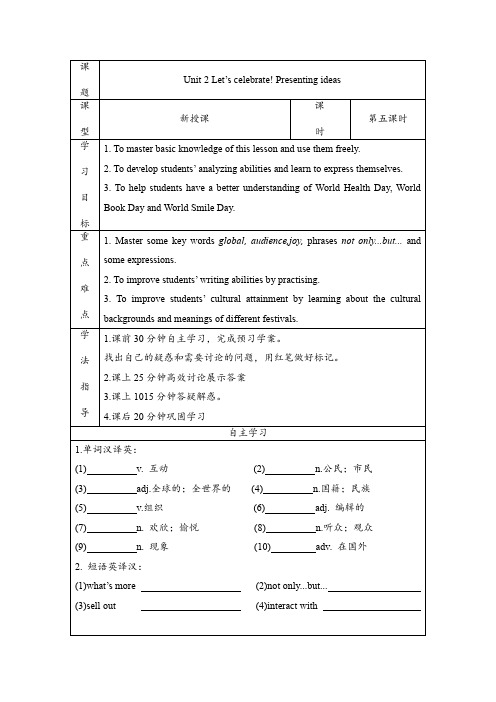
1. Look at the pictures and answer the questions.(1) Do you know any of these days?(2) Why do you think people create these days?2. Brief introductions of the three festivals.World Book Day was founded by UNESCO in 1995 and is celebrated on 23rd April every year. It shows respect for authors and their books all over the world and encourages people to read as much as possible.Reading gives knowledge, creative power, satisfaction and relaxation. It cultivate your mind by calling its faculties into exercise.阅读会带给你知识、创造力、满足感和放松。
它通过锻炼你的头脑技能来培养你的思维。
World Smile Day is the only festival to celebrate human behavioral expressions. It was set up by the World Mental Health Organization in 1948 and is celebrated on 8th May every year in the hope to promote human physical and mental health. Meanwhile, smile passed from one another can help build a harmonious society.World Health Day was founded in memory of the founding of the World Health Organization in 1948. Since 1950, it has been celebrated on 7th April , aiming to raise concerns for human health and emphasize the importance of health in work and life.。
九年级英语教案第二单元Unit2Self-CheckandReading学案人教版

作者VX:免费范文九年级英语第二单元Unit 2 Self-Check and Reading学案人教版九年级英语第二单元unit 2 self-check and reading学案人教版unit 2self-check and reading学习目标1.掌握借助上下文学习新单词和短语的方法。
2.掌握下列知识点:■重点词汇:death,cause,himself,patient,attention,waste,afford■重点短语:①in the end②make a decision③to one's surprise④even though⑤no longer⑥take pride in ⑦pay attention to ⑧give up ⑨a fifteen-year-o1d boy■重点句型:①it seems that yu mei has changed a lot.②she also to1d me that even though my father was no longer with us,he was watching me and would always take pride in everything good i do.预习导学i.英汉短语互译。
1.最后;终于2.even though3.对……注意;留心4.to one's surprise5.对……感到自豪6.make a decisionⅱ.阅读reading部分,回答下列问题。
7.how o1d is martin murray?8.has martin changed in the end?合作研讨一、重点单词与短语1.death n.死;死亡例如:his petdog’s death made him very sad.宠物狗的死使他很伤心。
【辨析】die/dead/dying/death①die u.意为“死”,强调的是“死”的瞬间动作,为非延续性动词,不能和表示一段时间的短语边用。
人教版八年级英语上册(学案):Unit2SectionB2a—2e
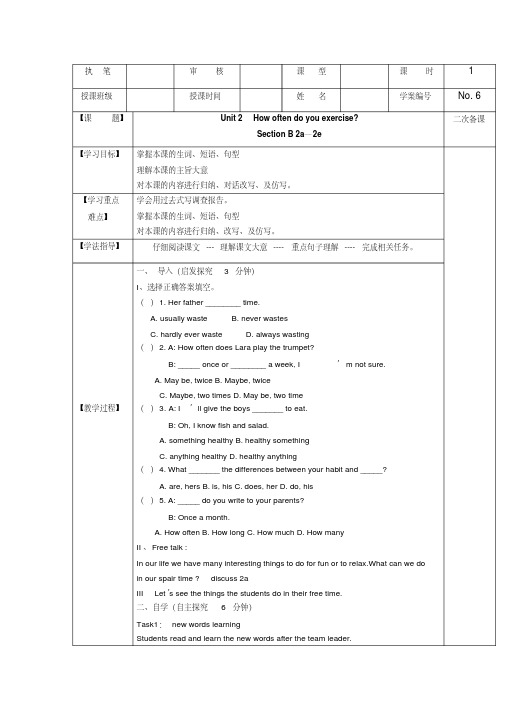
执笔审核课型课时 1 授课班级授课时间姓名学案编号No. 6 【课题】Unit 2 How often do you exercise?Section B 2a—2e二次备课【学习目标】掌握本课的生词、短语、句型理解本课的主旨大意对本课的内容进行归纳、对话改写、及仿写。
【学习重点难点】学会用过去式写调查报告。
掌握本课的生词、短语、句型对本课的内容进行归纳、改写、及仿写。
【学法指导】仔细阅读课文---理解课文大意----重点句子理解----完成相关任务。
【教学过程】一、导入(启发探究 3分钟)I、选择正确答案填空。
()1. Her father ________ time.A. usually wasteB. never wastesC. hardly ever wasteD. always wasting()2. A: How often does Lara play the trumpet?B: _____ once or ________ a week, I’m not sure.A. May be, twiceB. Maybe, twiceC. Maybe, two timesD. May be, two time()3. A: I’ll give the boys _______ to eat.B: Oh, I know fish and salad.A. something healthyB. healthy somethingC. anything healthyD. healthy anything()4. What _______ the differences between your habit and _____?A. are, hersB. is, hisC. does, herD. do, his()5. A: _____ do you write to your parents?B: Once a month.A. How oftenB. How longC. How muchD. How manyII、Free talk :In our life we have many interesting things to do for fun or to relax.What can we do in our spair time ? discuss 2aIII Let’s see the things the students do in their free time.二、自学(自主探究 6分钟)Task1: new words learningStudents read and learn the new words after the team leader.【教学过程】Students read the new words by themselves.result [r?'z?lt] .结果;后果percent [p?'’ent] adj.百分之... 的’online [??n'la?n] adj.在线的adv.在线地’elevision ['tel?v??n] n.电视机;电视节目‘although [??l'e??] conj.虽然;尽管;然而;可是thr’ugh[θru?] prep.穿过;凭借;一直到body ['b?di] n.身体min‘ [ma?nd] .头脑;想法;意见;心思such [s?t?] adj.这样的;如此的together [t?'ɡee?(r)] adv.共同;一起’Task2:听2b磁带,体会语音、语调、句群停顿,理解段落的汉语意义。
九年级英语第二单元Unit 2 Section B学案人教版

九年级英语第二单元Unit 2 Section B学案人教版九年级英语第二单元Unit 2B学案人教版Unit 2B(1a—2c)学习目标谈论自己过去喜欢的事情。
2.掌握下列知识点:■重点词汇:hate,candy,chew,gum■重点短语:①wall ②am ③all④worry about⑤chew gum■重点句型:We have to take thebu■语法:反意疑问句预习导学Ⅰ.英汉短语互译。
1.步行去上学2.chew gum3.一直;总是amⅡ.预习Bla,1b,写出你小时候喜欢的事情。
5.I used to like6.I used to7.I used合作研讨一、重点单词与短语ateu.讨厌;恨;不喜欢例如:I used to hate music class.我过去讨厌音乐课。
【拓展】hate后跟名词、代词、动名词或不定式作宾语,同义词为dislike,反义词like。
【跟踪训练】(1)他不喜欢在晚上开车He hates at nig2.chew.嚼;咀嚼【跟踪训练】(2)吃饭要细嚼慢咽。
You must your food well bu swallowworry about担心;焦虑【拓展】与be worried about同义【跟踪训练】(3)不要担心她。
Don't 二、重点句型与语法■句型We have to take the bu我们不得不乘公共汽车去上学。
【精解】①have to意为“必须;不得不”,后跟动词原形。
【辨析】have to/muave to具有客观性,不以人的主观意志为转移;而must强调主观性。
have to可以用于各种时态,而must则不能。
【跟踪训练】(4)他不得不早起赶早班车。
He get up early to caarly bus。
(5)我们必须学好英语。
We learn English .【精解】②take the bus意为“乘公共汽车”,“take+the+交通工具”,相当于“by+交通工具”。
新课标高中英语必修二unit2学案
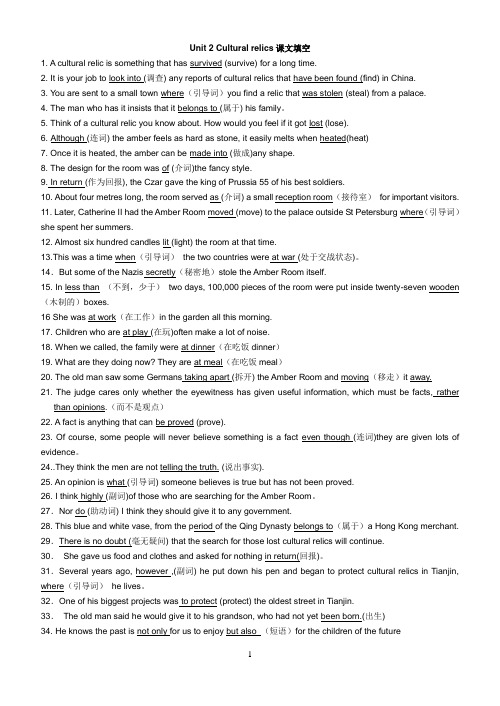
1. A cultural relic is something that has survived (survive) for a long time.2. It is your job to look into (调查) any reports of cultural relics that have been found (find) in China.3. You are sent to a small town where(引导词)you find a relic that was stolen (steal) from a palace.4. The man who has it insists that it belongs to (属于) his family。
5. Think of a cultural relic you know about. How would you feel if it got lost (lose).6. Although (连词) the amber feels as hard as stone, it easily melts when heated(heat)7. Once it is heated, the amber can be made into (做成)any shape.8. The design for the room was of (介词)the fancy style.9. In return (作为回报), the Czar gave the king of Prussia 55 of his best soldiers.10. About four metres long, the room served as (介词) a small reception room(接待室)for important visitors.11. Later, Catherine II had the Amber Room moved (move) to the palace outside St Petersburg where(引导词)she spent her summers.12. Almost six hundred candles lit (light) the room at that time.13.This was a time when(引导词)the two countries were at war (处于交战状态)。
新教材高中英语Unit2TravellingAround单元素养培优学案(含解析)新人教版
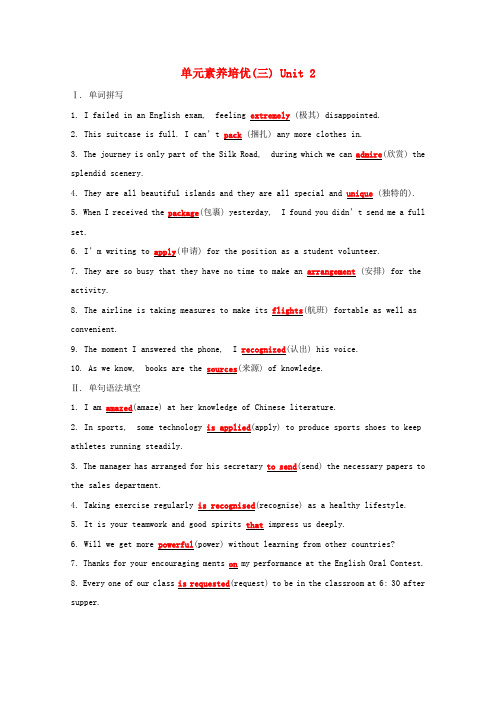
单元素养培优(三) Unit 2Ⅰ. 单词拼写1. I failed in an English exam, feeling extremely (极其) disappointed.2. This suitcase is full. I can’t pack (捆扎) any more clothes in.3. The journey is only part of the Silk Road, during which we can admire(欣赏) the splendid scenery.4. They are all beautiful islands and they are all special and unique (独特的).5. When I received the package(包裹) yesterday, I found you didn’t send me a full set.6. I’m writing to apply(申请) for the position as a student volunteer.7. They are so busy that they have no time to make an arrangement (安排) for the activity.8. The airline is taking measures to make its flights(航班) fortable as well as convenient.9. The moment I answered the phone, I recognized(认出) his voice.10. As we know, books are the sources(来源) of knowledge.Ⅱ. 单句语法填空1. I am amazed(amaze) at her knowledge of Chinese literature.2. In sports, some technology is applied(apply) to produce sports shoes to keep athletes running steadily.3. The manager has arranged for his secretary to send(send) the necessary papers to the sales department.4. Taking exercise regularly is recognised(recognise) as a healthy lifestyle.5. It is your teamwork and good spirits that impress us deeply.6. Will we get more powerful(power) without learning from other countries?7. Thanks for your encouraging ments on my performance at the English Oral Contest.8. Every one of our class is requested(request) to be in the classroom at 6: 30 after supper.9. You are interested in how we show respect for our teachers and here is something detailed(detail).10. I don’t agree with her, but I admire her for sticking to her principles. Ⅲ. 完成句子1. You will have a day to explore and be amazed by/at(惊奇于) this ancient city.2. I have to make up for(弥补) the lesson I missed yesterday.3. All of the children feel like tasting/would like to taste(想要品尝一下) the specially designed cake.4. Do you speak any foreign language other than(除……之外) English?5. You have to check in(登记) at the airport an hour before your plane leaves.6. She failed in her attempt to take control of (控制) the pany.7. The Internet helps me to keep in contact (保持联系)with my friends.8. He was looking forward to(期望) working with the new Prime Minister.9. What should we prepare for(为……做准备) the tour?10. Some students think that they should be in good health so that (以便于)they can enjoy their life better.Ⅳ. 根据语境用所给动词的正确时态填空1. Wait a minute; I am finishing(finish) my homework.2. I’m meeting Peter tonight. He is taking(take) me to the theatre.3. I am bringing(bring)my own lunch when I play in the park this Sunday.4. The movie starts(start) at 8 o’clock, so we still have one hour to have a meal.5. As soon as he es(e) back, I will tell you.6. Because the shop is closing (close) down, everything is sold at half price.7. Winter is ing(e), and the weather is getting colder and colder.8. Tom, Mr White is leaving (leave). Will you please show him out?9. Ladies and gentlemen, please turn off your cell phones or laptops. The plane is taking(take) off.10. If you e(e) to my hometown next month, I’ll treat you to a big dinner.Ⅴ. 阅读理解A(2021·大连高一检测) STA Travel, the world’s largest students and youth travel agency,beats any price! Every day we’re worki ng with our partners around theworld to get you (students, teachers and anyone under 26) the cheapestand most fortable fights and acmodations. This part of statravel.provides great tips for green travel—how to pack, how to leave your house orap artment, and how to plan for your trips. You’ll also find a great number of green travel adventure (探险) trips to all ers of the world.Green travel means responsible travel! Leave as little influence as possible on the places you visit and protect the environment both at home and during your trip. Think “Green” when you pack and when you travel. You’ll help prevent longterm effects on the munities you leave and visit!Here’s some advice on how to do that.Before you leave◆Turn your water heater to its lowest setting.◆Turn off your water from the outside.◆Pack suitable clothes in your luggage, none of which is to harm the environment.While you travel◆Try products made from recycled materials.◆Don’t buy souvenirs produced from endangered specie s (物种).◆Carry a reusable bottle for water and refill it as you go.◆Use the bathroom in the airport, NOT on the plane. The fuel used for a single flush (冲洗) could run a car for six miles.【文章大意】主要介绍了STA旅行社, 世界上最大的学生和青年旅行社, 价格无与伦比! 同时在 statravel. 这个网站上为绿色旅行者提供了很多小贴士, 绿色旅行意味着负责任的旅行! 尽量减少对旅游地点的影响, 保护家居及旅游期间的环境。
人教英语必修1 Unit 2 导学案(全单元)
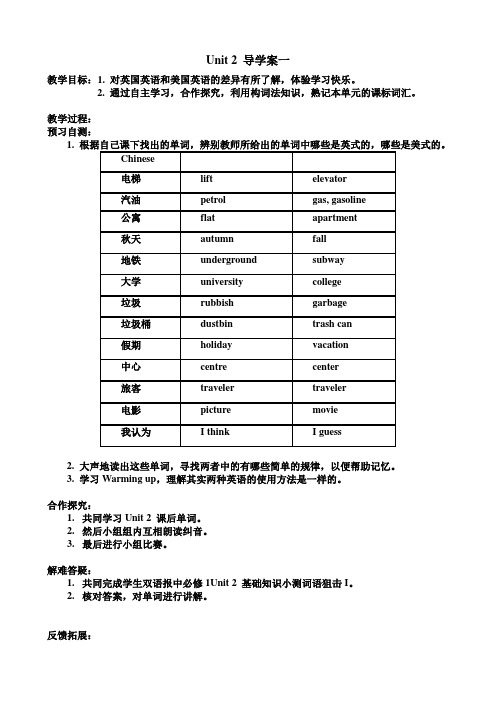
Unit 2 导学案一教学目标:1. 对英国英语和美国英语的差异有所了解,体验学习快乐。
2. 通过自主学习,合作探究,利用构词法知识,熟记本单元的课标词汇。
教学过程:预习自测:1.2. 大声地读出这些单词,寻找两者中的有哪些简单的规律,以便帮助记忆。
3. 学习Warming up,理解其实两种英语的使用方法是一样的。
合作探究:1.共同学习Unit 2 课后单词。
2.然后小组组内互相朗读纠音。
3.最后进行小组比赛。
解难答疑:1.共同完成学生双语报中必修1Unit 2 基础知识小测词语狙击I。
2.核对答案,对单词进行讲解。
反馈拓展:1.共同完成学生双语报中必修1Unit 2 基础知识小测词语狙击II。
2.核对答案,对单词词形、词意进行拓展。
课后作业:从本单元单词中挑选10以上编一个小短文。
教学反思:________________________________________________________________________________ ________________________________________________________________________________ ________________________________________________________________________________Unit 2 导学案二教学目标:1.掌握本学案中所提及的重点单词(4个)、短语(2个)、词语辨析(2组)句型结构(3个)的用法。
2. 通过练习,进一步巩固所学单词、短语在语境中的运用。
教学过程:预习自测:1.请大声朗读下面的词汇elevator petrol official native apartment actually gradualvocabulary spelling latter identity fluent frequent commandrequest expression African eastern recognize lorry voyagebase accent lighting straight block usagebecause of come up at present make use of such as play a part in请同学们用红笔标出自己在发音中存在困难的单词。
人教版必修一Unit 2 Travelling Around Reading for 学案(含答案)

Unit 2 Travelling Around Reading for Writing——2022-2023学年高一英语人教版(2019)必修第一册课前导学一、课前预习学写作规范从文体上看,本单元的写作任务是写应用文类别中的“电子邮件”。
电子邮件的格式通常包括三部分,即开头、正文和结尾。
因此,邮件的正文是重中之重。
从题材上看,本单元的写作话题为“旅游计划”。
旅游计划是外出旅游时的必备项。
一、基本结构介绍旅游计划的电子邮件一般包括以下几部分内容:1.开头(beginning):旅游目的地和出行时间;2.主体(body):选择目的地的原因;旅行中的活动安排(还可以写关于旅游费用、同行者等内容);3.结尾(ending):询问计划;表达期望。
二、注意事项1.写作文体:电子邮件属于应用文。
2.主体时态:现在进行时表将来(也可使用一般将来时),也可以根据需要适当使用其他时态。
3.主体人称:第一人称和第二人称。
二、自我检测1.I _____ (attack) by a dog when I was a child.2.His father threatened _____ (throw) him out,but he knew it was an empty threat.3.I can work ________ pressure and get along with my colleagues.4.The photos reminded me ________ the days that we spent together in the summer camp.5.It took him a while to adapt himself ________ his new surroundings.6.Apart ________ its low price, the advantage of this car lies in its good quality.7._____ is surprising that your brother can pick up Russian so quickly.8.直到亲眼见到,我才会相信。
_新教材高中英语Unit2SUCCESS单元复习学案北师大版选择性必修第一册
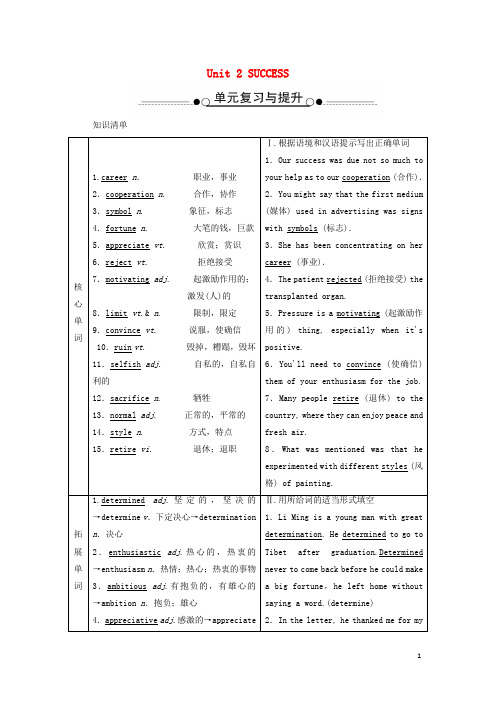
Unit 2 SUCCESS 知识清单核心单词1.career n.职业,事业2.cooperation n. 合作,协作3.symbol n. 象征,标志4.fortune n. 大笔的钱,巨款5.appreciate vt. 欣赏;赏识6.reject vt. 拒绝接受7.motivating adj. 起激励作用的;激发(人)的8.limit vt.& n. 限制,限定9.convince vt. 说服,使确信10.ruin vt. 毁掉,糟蹋,毁坏11.selfish adj. 自私的,自私自利的12.sacrifice n. 牺牲13.normal adj. 正常的,平常的14.style n. 方式,特点15.retire vi. 退休;退职Ⅰ.根据语境和汉语提示写出正确单词1.Our success was due not so much toyour help as to our cooperation (合作).2.You might say that the first medium(媒体) used in advertising was signswith symbols (标志).3.She has been concentrating on hercareer (事业).4.The patient rejected (拒绝接受) thetransplanted organ.5.Pressure is a motivating (起激励作用的) thing, especially when it'spositive.6.You'll need to convince (使确信)them of your enthusiasm for the job.7.Many people retire (退休) to thecountry, where they can enjoy peace andfresh air.8.What was mentioned was that heexperimented with different styles (风格) of painting.拓展单词1.determined adj.坚定的,坚决的→determine v.下定决心→determinationn.决心2.enthusiastic adj.热心的,热衷的→enthusiasm n.热情;热心;热衷的事物3.ambitious adj.有抱负的,有雄心的→ambition n.抱负;雄心4.appreciative adj.感激的→appreciateⅡ.用所给词的适当形式填空1.Li Ming is a young man with greatdetermination. He determined to go toTibet after graduation.Determinednever to come back before he could makea big fortune,he left home withoutsaying a word.(determine)2.In the letter, he thanked me for my词汇拓展[即时演练]Ⅰ.单句语法填空1.Don't be discouraged (discourage). Take things as they are and you will enjoy every day of your life.2.Before, he was an extremely devoted (devotion) physician,who treated his work seriously and cared for patients very much.3.His speech was inspiring (inspire) and touched my heart.4.I am very disturbed (disturb) by the complaints that have been made against you.Ⅱ.补全句子1.Try to learn survival skills your teacher told you.努力学习老师告诉你的生存技巧。
unit2 Wildlife protection A Day in the Clouds 学案
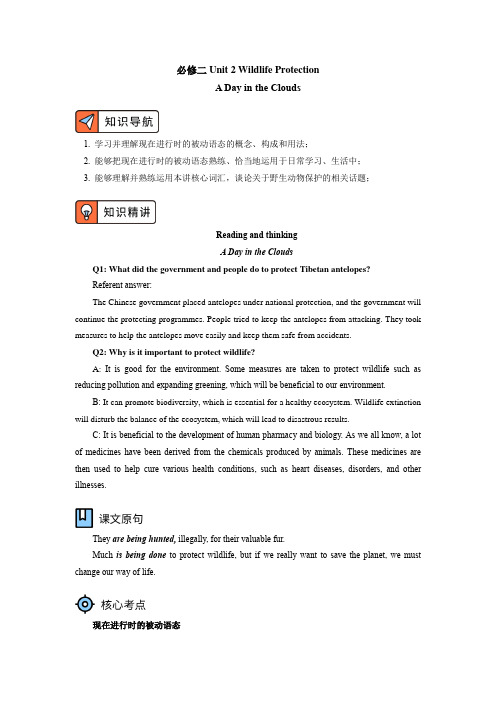
必修二Unit 2 Wildlife ProtectionA Day in the Clouds1. 学习并理解现在进行时的被动语态的概念、构成和用法;2. 能够把现在进行时的被动语态熟练、恰当地运用于日常学习、生活中;3. 能够理解并熟练运用本讲核心词汇,谈论关于野生动物保护的相关话题;Reading and thinkingA Day in the CloudsQ1: What did the government and people do to protect Tibetan antelopes?Referent answer:The Chinese government placed antelopes under national protection, and the government will continue the protecting programmes. People tried to keep the antelopes from attacking. They took measures to help the antelopes move easily and keep them safe from accidents.Q2: Why is it important to protect wildlife?A: It is good for the environment. Some measures are taken to protect wildlife such as reducing pollution and expanding greening, which will be beneficial to our environment.B: It can promote biodiversity, which is essential for a healthy ecosystem. Wildlife extinction will disturb the balance of the ecosystem, which will lead to disastrous results.C: It is beneficial to the development of human pharmacy and biology. As we all know, a lot of medicines have been derived from the chemicals produced by animals. These medicines are then used to help cure various health conditions, such as heart diseases, disorders, and other illnesses.They are being hunted, illegally, for their valuable fur.Much is being done to protect wildlife, but if we really want to save the planet, we must change our way of life.现在进行时的被动语态1. 定义表示“某人/事此时此刻正在被……”,主语是动作的承受者。
- 1、下载文档前请自行甄别文档内容的完整性,平台不提供额外的编辑、内容补充、找答案等附加服务。
- 2、"仅部分预览"的文档,不可在线预览部分如存在完整性等问题,可反馈申请退款(可完整预览的文档不适用该条件!)。
- 3、如文档侵犯您的权益,请联系客服反馈,我们会尽快为您处理(人工客服工作时间:9:00-18:30)。
Unit2 What’s the matter?第一课时(SectionA1a ---2c)[学习目标]谈论健康并给出建议.[学习过程]一.自主学习1.单词:掌握身体各部分.1)(复数)______ 2)(复数)______ 3)头痛________4)牙痛_____ 5)发烧______6)胃痛_________2.短语1)感冒_________ 2)胃痛____________3)躺下休息__________ 4)看牙医__________5)加蜂蜜的热茶___________6)喝大量的水_______7)背痛__________8)发烧_______________二.知识点拨1.What’s the matter? 怎么了?1)该句是一个特殊疑问句,在此处用于询问对方的身体情况,也是医生或护士询问病人病情的常用语.如果具体说到“某人如何”时,多用with sb..如:What’s the matter with you today?2)表示关心对方,询问对方身体状况,或遇到麻烦,困扰时,还可用其他的句子表达.如:a. What’s wrong? What’s wrong with you?b.What’s your trouble? What’s the trouble with you?c.What’s up ?d.Is there anything wrong with you?注意:matter是名词,其前须加定冠词the;wrong是形容词,其前不需加任何修饰词;trouble是名词,其前可加定冠词the,也可以加形容词性物主代词.拓展:matter还可用作动词,意为“要紧,关系重要”,主要用于疑问句和否定句中. 如:It doesn’t matter if you are late.2.表示疾病常见的短语有:1)have a cold感冒,伤风2)have a stomachache肚子痛3)have a fever发烧4)have a cough咳嗽5)have headache头疼6)have a toothache牙疼3.should ,shouldn’t 的用法向对方提出建议时可用should ,shouldn’t,应该…,不应该…,其后加动词原形.例如: A:What’s the matter? B: I have a bad cold.A: You should drink lots of water.三.随堂练习1.用所给词的适当形式填空.1)You shouldn’t _______(go) shopping.2)I have ______(lot) of books about English.3)The boy _____(have) a cold three days ago.4)My head hurts ,I have a ________(head).2.完成句子1)你怎么了?What’s _____ ______with you?2)你应该躺下来休息两天.You should _____ ______ _______ ______for two days.3)你不应该吃东西You shouldn’t _______ _______.4)A:你妈妈怎么了?What’s __________ ________you?B:她发高烧.She_________ ________high________.四.优化作业:连词成句.1.have, I ,throat ,sore ,a2.Jim, toothache, a ,has3.lie, and ,rest, should, she ,down4.should ,much ,you, water, drink5.should, honey , tea, you, hot, some,with, drink五.自我展示.[我的收获—我快乐][我的不足—我改正]第二课时(SectionA 3a---4)[学习目标]掌握运用看医生时的交际用语.[学习过程]一.自主学习单词:1.ill(名词)______2.劝告,忠告________3.牙医_______4.应该________5.发烧________6.牙疼_______短语:1.两天以前__________2.感冒___________3.I think so.________4.嗓子疼_________5.躺下休息_____________6.have a headache_________二.知识点拨1.I hope you feel better soon.我希望你很快好起来.1)句子you feel better是一个由that引导的宾语从句,that在从句中不作任何成分,只作引导从句的连词(可省略).宾语从句也就是一个句子作宾语.例如:I think you are right.我认为你是对的.2)hope的用法a.其后可接从句作宾语.We hope they can come earlier我们希望他们早点来.b.其后+不定式.构成hope to do sth.I hope to finish my homework at eleven o’clock.2.归纳表示建议的句式1)Let’s+动词原形咱们干…2)Why not+动词原形? 为什么不…?3)How /What about+名词/代词/v-ing …怎么样?4)should+动词原形. 应该…5)had better(最好)+动词原形. 最好…三.随堂练习(一)给下列疾病选出最佳治疗方案,把字母填入题前括号内. ( )1.I have a toothache a.You should go to bed.( )2.I have a sore throat. b.You should go to bed.( )3. I have a fever. c.you should see a dentist.( )4. I have a stomachache. d. You should drink much water.( )5. I have a headache. e. You should drink hot tea with honey.(二)选择1.---What’s ________matter with you? ---Headache.A. aB.anC.theD./2.When did you toothache start?A. About 2 daysB. Two days later.C.Two days beforeD.About two days ago.3. I have a pain____my stomache.A.inB.withC. toD.for4.You are ill.You should________A. see the doctorB.play basketballC.see the dentistD.have a little rest四.优化作业(一)用所给词的适当形式填空.1.Tom’s ___________(ill) is very bad.2.Every day we must clean our_________(tooth).3.He shouldn’t eat __________(something)for 24 hours.4.---_____you________(have) a cold? ---Yes, I do.5.---What’s the matter with you mother? --- She ____ ______cold.(二)完成句子1.---What’s the matter? ---I______ _________ ________(发烧).2.---I_______ _______ _______(牙疼).---You _____ ________ ________ __________(应该看牙医).3.---When did it start? ---About_______ ________ ____(两天前).4.I hope ________ _________ _______ ________(很快好起来).5.Why not _________ _______ _________ ________(喝许多水).五.自我展示[我的收获—我快乐][我的不足—我改正]第三课时(SectionB 1a –2c)[学习目标]正确使用“看医生”时的交际用语,词汇及其结构.[ 学习过程]一.自主学习单词:1.渴的_______2.提早,提前__________3.problem________4.way_______5.使紧张_________6.疾病________短语1.喝一些水__________2.听音乐__________3.早睡_____________4.踢足球___________二.知识点拨1.stressed out过度紧张的1)stressed作形容词,在此为“精神上紧张的,有压力的”,此处的out作副词,表示程度.---What’s the matter,Tony? --- I’m stressed out.2)stress可作名词,意为“压力,紧张”常与under连用,表示“在…的压力下”.He is under great stress because of his new job.新工作使他感受到了沉重的压力。
2.listen to music1)listen是不及物动词,意思是听,倾听。
强调听的动作,若其后跟宾语,则需要加介词to,构成动词词组,而hear是听到,听见,强调“听”的结果。
Don’t talk,please listen to me.听讲了,听我说。
I listened carefully but heard nothing. 我仔细听,但什么也没听到。
2)listen可用于祈使句和进行时,而hear则不能。
Listen to me now! 现在听我说Be quiet .I’m listening to the news. 安静,我正在听新闻。
三.随堂练习1.She looks ________(stress).2.She is t________,she should have a good rest.3.Don’t _________(be)stressed out.4.I think you are ill. You had better_________(see)a doctor.5.你应该听音乐放松自己。
